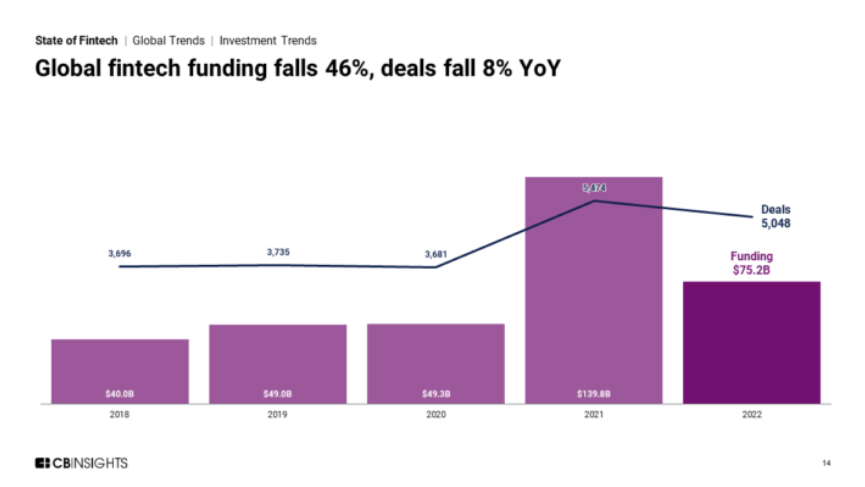The State of FinTech - From 2022 to Leading Trends for the 2023
By Bill Hortz
What is going on in financial technology? Trying to stay on top of FinTech technology trends, new business/platform models, and emerging startup companies in our business environment of accelerating change is a tall task. Here is a brief overview of FinTech industry analysis and prediction to give us a solid perspective of where we are and where we may be going.
CBInsights - State of Fintech 2022 Report
Global fintech investment activity steadily declined throughout 2022. Reaching $75.2B in 2022 global funding, last year marked a 46% drop from 2021's record levels with the funding slowdown especially severe in the second half of the year. Q4’22 funding came in at $10.7B — the lowest quarterly level since 2018. The number of deals fell 8% year-over-year to reached 5,048 in 2022. But, it is important to note that funding was up 52% compared to 2020.
Here are a handful of highlights from CBInsights 178-page, data-driven State of Fintech 2022 Report. For deeper insights, all the record figures, and a ton of private market data, you can download the full report.
Other 2022 highlights across fintech include:
·$100M+ mega-rounds accounted for $36.5B in funding in 2022, marking a 60% drop from 2021.
Banking funding declined 63% YoY — the sharpest drop across fintech sectors analyzed — to return to pre-Covid levels.
US fintech funding fell 50% YoY to $32.8B. Despite the drop, 2022 was the second-highest funding year for US FinTechs on record.
Africa-based FinTechs saw a record 227 deals in 2022, a 25% increase YoY.
Insurtech M&A exits reached a new high, rising 40% in 2022 to 81 deals.
Fintech unicorn births steadily declined throughout 2022, sinking to a low of 5 new unicorns in Q4’22 — an 87% drop compared to Q4’21.
FinTech Global - What 2023 Will Mean for FinTech
Coming off a tough year, FinTech Global sees that 2023 could be tough to predict for FinTech. Nevertheless, speaking to WealthTech professionals, here are some trends they predict that will likely take shape during 2023.
WealthTech:
The generational shift in wealth toward younger investors will push banks and wealth managers to reimagine their client communications continuing their move towards a digital-first, real-time engagement service.
Social media platforms have become a major source of investment advice for younger people leading to the question of how financial institutions can compete with those online platforms.
Growth of functionality into cutting-edge financial planning capabilities in FinTech platforms and advisor tech stacks to be able to provide a better, more integrated user experience.
One of the biggest trends of the year may well be that portfolio management systems and wealth management platforms will continue their consolidation of the advisor and wealth manager tool chain.
ESG FinTech:
With climate change and societal challenges becoming a top priority for governments and businesses alike, it has allowed for many ESG FinTech companies to prosper and will remain a major priority in 2023.
One question that has caused fear ripples across the ESG sector is whether budgets will shrink for these ESG FinTech projects during a recession. But firms are no longer in a position to simply move away from ESG due to the coming regulations happening globally.
ESG FinTech firms will continue to support investors and firms with ESG expertise, and a data-driven approach to transform and accelerate their ESG journey
Restive Ventures Industry Report - 2022’s Fintech Trends and What 2023 Has to Offer
Interesting perspective from this pre-seed and seed stage FinTech fund Restive Ventures. To produce the 2023 fintech report, Restive Ventures surveyed peer investors, industry partners and regulators. Bottomline in this segment - As investment falls, regulation and partnerships are to rise.
FinTech investment - While the news for fintech investment ultimately looks negative, with not much indication of an upturn on the horizon, Restive Ventures’ survey found that investors were still looking to invest in the sector. B2B payments; climate tech; RegTech; embedded finance infrastructure; vertical SaaS, and “Web3 with good use cases” were all areas that investors said they were focused on investing in throughout 2023.
FinTech regulation - As fintech investment fell, fintech regulation appears to be significantly on the rise. Restive explains that banking-as-a-service (BaaS) providers could see increased regulation in 2023 due to the risks posed by companies’ ability to scale rapidly as the main reason for greater attention. Much enhanced regulation is also expected in an effort to make consumer data safer with the biggest technology firms to experience the most pressure in the coming months although smaller firms could begin to see an increased need for privacy requirements. The Restive report suggests that meaningful changes around crypto regulation due to the FTX debacle could take a long path where we may not see laws passed until 2024 or beyond.
FinTech partnerships - Of the Restive industry partners surveyed for the report, 80% expect their partnerships to increase in 2023 with particular interest in partnering with FinTechs specifically on data and AI, and those covering both fraud and payments.
